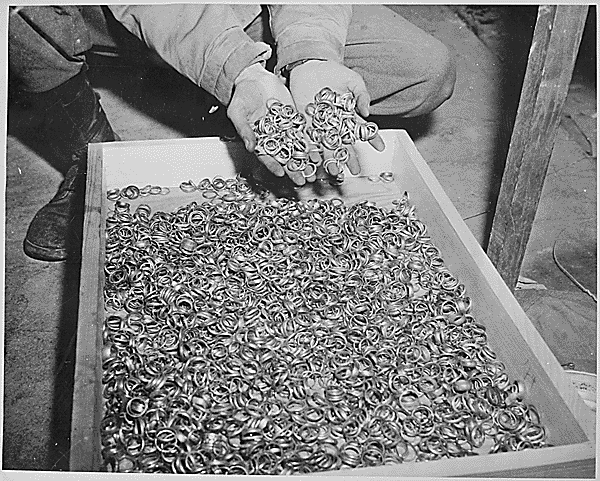
Holocaust Remembrance Day 2021
By Victoria Blue | National Archives News
WASHINGTON, April 7, 2021 — Beginning on the evening of Wednesday, April 7, communities around the world observe Yom HaShoah (Holocaust Remembrance Day) and remember the victims of the Holocaust. The observance ends the evening of Thursday, April 8.
The National Archives is home to millions of records created or received by the U.S. Government during and after World War II that document Nazi war crimes, wartime refugee issues, and activities and investigations of government agencies involved in the identification and recovery of looted assets (including gold, art, and cultural property).
“The National Archives holds millions of pages of records that document various aspects of the Holocaust, including Nazi war crimes investigations and trials, concentration camp records, and records relating to Nazi looting of cultural and other property across Europe,” said Sylvia Naylor, an archivist at the National Archives at College Park. Naylor is the National Archives’ Subject Matter Expert in Holocaust-Era assets. “We strive to make these records available to increase public awareness and remembrance of the Holocaust.”
The Holocaust-Era Assets web pages are a valuable resource of the records related to looting, locating, recovering, and restituting Holocaust-Era assets. This includes records related to looted cultural property (including books, archives, manuscripts, and Jewish communal property), looted art works, unpaid and unclaimed insurance policies, and issues surrounding slave and forced labor.
Another resource for Holocaust and World War II–related records is the History Hub, the National Archives’ support community for researchers, genealogists, history enthusiasts, and citizen archivists. Through the History Hub, researchers can ask questions, share information, work together, and find help based on experience and interests.
The National Archives also holds captured German records that were used as evidence at the Nuremberg International Military Tribunals. You can help us tag and transcribe the records from the Nuremburg Trials as a citizen archivist.
To learn about Holocaust records, sign up for the Franklin D. Roosevelt Presidential Library’s "Examining American Responses to the Holocaust: Digital Possibilities" virtual conference in October. Registration is free.
Other resources include:
- World War II War Crimes Records
- Holocaust-Era Art Provenance and Claims Records and Research at the National Archives and Records Administration
- Selected Digitized Documents Related to the Holocaust and Refugees, 1933–1945 from the Franklin D. Roosevelt Presidential Library
- Holocaust-Related Lesson Plans from the Harry S. Truman Presidential Library
- “An Orphan of the Holocaust: His Journey to America” (Prologue magazine, Summer 2012)
